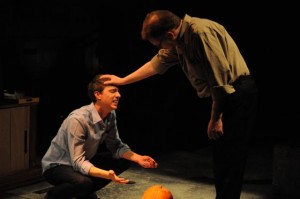
Credit: Emily Cooper
At Pacific Theatre until May 25
604-731-5518/www.pacifictheatre.org
Posted on April 28, 2013
I don’t know that the Bible needs a new book but Jesuit priest/ playwright Bill Cain has some ideas about what that book should look like. He suggests that every family adds its own story to the end of the Bible.
The central character in Cain’s play – a Jesuit priest/ playwright called Bill Cain – tells us he sees the Bible as a family story with Jesus, the much-loved son of Mary, leaving home at seventeen and never going back to visit his mother. The play actually resonates more strongly with the story of the prodigal son and the jealousy between the dutiful son and his profligate brother.
Of Jesus, Bill (Anthony F. Ingram) pronounces, “He was a lousy son.” Not so Bill. When his mother Mary is diagnosed with terminal cancer, he moves in to care for her. His younger brother Paul remains in El Paso leaving all the caregiving to his mother’s favourite.
Irreverence is this play’s strong suit along with director Morris Ertman’s light touch. Mary (Erla Faye Forsyth) is a stoical, church-going Catholic mother of two whose favourite expression, when frustrated, is “Go shit in your hat”. She disses Biblical mothers, saying, “They float their babies down the river in baskets” and, scornfully, “They have babies in their 80s.” Her irreverence for everything with the exception of the New York Knicks and TV talk shows are what provide levity to an otherwise somber story.
Far from preaching to us, Bill has doubts and asks, “Does God answer prayers?” Clearly he doesn’t because right off the top we know that Bill’s mother has just died a long and agonizing death.
How To Write A New Book For The Bible is autobiographical and it’s told in flashbacks and flashforwards from the point-of-view of Cain/Bill. It documents the indignities of dying in all its ferocious minutiae. The strength of this play lies not in plot points but in the relationship between Bill and Mary and all the emotions – positive and negative – that are the characteristics of love.
It is a great pleasure to see Ingram and Forsyth working together. The story moves back and forth in time so we see Mary as a young, energetic mother of two bickering boys and later, an aging Mary gripped with pain. Forsyth is the mistress of dry, withering sarcasm: “You don’t have a job,” Mary says to Bill. “You’re a writer.” There’s plenty of this kind of acidic repartee and Forsyth and Ingram do it so well.

Anthony F. Ingram
Credit: Damon Calderwood
Ingram is both the main character and the narrator. The fourth wall is down and much of the time, Bill addresses us directly with self-effacing candour. Ingram offers a man full of the contradictions we have with those we love: frustration, affection, anger, irritation and compassion. But underlying his character’s exasperation at his mother’s furtive cigarette smoking and obsession with TV sports, Ingram shows us the deep and abiding love he has for his mother.
Daniel Arnold, as Bill’s brother Paul is appropriately strung out and tense. Arnold makes us painfully aware of the longing Paul has for Mary’s love and approval. She’s one hard mother to please. Byron Noble, as Bill’s deceased father Pete, is a ghostly character that flows in and out of the play. He and Arnold also take on various other roles throughout.
Lauchlin Johnston’s set, evocatively lit by Jeff Harrison, is simple but effective; composer Luke Ertman’s soundscape puts us, on occasion, in front of the TV or at the movies with more music than the play needs.
Without really fine performances, How To Write – albeit it witty and funny – would be just another story of the death of someone’s mother. Fortunately, this quartet of excellent performers makes this production very satisfying and, if not actually uplifting, at least not tear-jerkingly sad.

Erla Faye Forsyth
Credit: Emily Cooper

